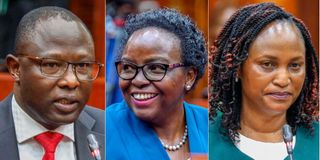IEBC nominations: Why court rejected contempt case against President Ruto

Independent Electoral and Boundaries Commission (IEBC) nominees (from left) Erastus Edung Ethekon, Mary Karen Sorobit and Ann Njeri Nderitu.
The High Court has declined a request to cite President William Ruto and the Government Printer in contempt of orders that stopped the formal appointment and gazettement of the persons nominated to be chairperson and members of the electoral commission.
A three-judge bench led by Justice Roslyne Aburili rejected the application after finding that it was made orally and that the targeted persons had not been granted the opportunity to be heard.
"In the absence of a formal application according to the alleged contemnor's opportunity to respond, we find the application is not well placed. The question of contempt cannot be determined meritoriously through oral arguments and where the alleged contemnors have not been granted opportunity to respond," said the bench comprising Justices Aburili, John Chigiti and Bahati Mwamuye.
The alleged contemnors included the President, the Attorney-General Dorcas Oduor, Government printer and Head of the Public Service Felix Koskei.
The court also found that some of the persons targeted by the application were not even parties to the case.
Quasi-criminal nature
It was held that due to the quasi-criminal nature of contempt proceedings and the gravity of the consequences that flow from such proceedings, the President and the other alleged contemnors could not be condemned unheard.
The contempt application was made on Monday by the lawyers representing two citizens in a case that is challenging President Ruto’s choice of electoral agency commissioners.

IEBC nominees Hassan Noor Hassan, Erastus Edung Ethekon (chairperson), Anne Nderitu and Mary Karen Sorobit.
Led by senior counsel Paul Muite, the lawyers wanted the alleged contemnors sentenced to at least two years or fined an amount that the court would have deemed fit.
The alleged offence was disobedience of court orders issued on May 29, 2025, restraining the gazettement of the seven people nominated by the President last month to the Independent Electoral and Boundaries Commission (IEBC).
The lawyer stated that there was wilful disregard of the order since on June 10, 2025, the President appointed and gazetted them.
The seven persons at the centre of the legal storm are Erastus Edung Ethekon (proposed chairperson) together with Hassan Noor Hassan, Mary Karen Sorobit, Anne Nderitu, Moses Mukwana, Francis Odhiambo and Fahima Araphat Abdallah.
Contempt
Mr Muite argued that President Ruto's decision to appoint the nominees and publish the appointments in the Kenya Gazette Notice in the face of the court order constituted an illegality and contempt.
The lawyers were representing petitioners Mr Kelvin Roy Omondi and Mr Boniface Mwangi.
However, the bench ruled that though court orders are not mere suggestions and obeying them is the cornerstone of the rule of law, courts are required to adhere to the principles of natural justice, procedural fairness, and the right to a fair hearing.
"Contempt proceedings are quasi-criminal in nature and speak to grave matters. Right to fair trial must be invoked and Article 50 of the Constitution on right to fair hearing must be observed. There must be procedural fairness," emphasized the bench.
At the same time, the court dismissed the petitioners' request for the production of the IEBC Selection Panel's final report, recommendation and score sheets of each penallist on each of the persons interviewed to be chairperson and member of the commission.
They also wanted to be furnished with the transmittal letter of the Panel addressed to the President and all enclosures.
But the court found that the petitioners had not exhausted the entire process of accessing the information sought, such as writing to the concerned entities and waiting for the 21-day statutory timeframe to lapse.

Erastus Edung Ethekon has been nominated by President William Ruto as IEBC chairperson.
"It was not demonstrated that the respondents have the information sought. The petitioners were caught up by the doctrine of exhaustion since there was an alternative remedy. They have not made up a case to compel respondents to produce the information on candidates' scores. The application dated June 15, 2025, is disallowed and cannot hold," said the court.
The petitioners' request was based on the provisions of Access to Information Act, 2016, which allows citizens to access information held by public entities.
They were aggrieved that President Ruto failed to disclose to Kenyans the reasons for his choice of the seven persons.
"The Selection Panel’s report and outcome of the interviews constituted important information to be shared with the public. It was unconstitutional for the President and the Selection Panel to fail to publicize the information relating to the performance of the candidates and the report on the interviews. The petitioners requested for the information pertaining to the interviews but their request was ignored," reads the court papers.
Nominations lacked transparency
The gist of the petitioners' case is a claim that the President failed to observe regional balance in the nominations, failed to consult the Opposition party/coalition and that the nominations lacked transparency since neither the report of the Selection Panel nor the score of each candidate in the interviews were disclosed to Kenyans. They believe the report should have been made public.
They also allege that four of the seven nominees -Mr Ethekon, Mr Hassan, Ms Sorobit and Ms Nderitu -were ineligible for the job.
The petitioners claim that the four were not qualified to apply or to be selected as members of the IEBC due to perceived bias, breach of the principles of political neutrality, vying for political posts in 2022, being members of a political party and failure to leave a State office before their nomination.
"The nominations contravene the Constitution in that they are not representative of Kenya’s diverse communities, excluding other ethnic communities and persons with disabilities. The nominees were selected without any prior consultation with the opposition political party as required under the National Dialogue Committee Report and IEBC (Amendment) Act, 2024,” says the petitioners.
The lawsuit is also questioning why President Ruto chose Mr Ethekon as chairperson over Mr Edward Katama Ngeywa, who had also been proposed to the same post by the Selection Panel.
Also questioned is the decision of the President to reject Mr Phillip Kakai (from Kakamega county), Mr Joseph Kyavoa (Kitui) and Mohammed Abdullahi Abdi (Mandera/Nairobi), whom the panel had proposed to be commissioners.
They further argue that the President failed to observe regional and ethnic balance, since two nominees -Mr Ethekon and Sorobit -are from the Rift Valley region while the Lower and Upper Eastern regions were excluded.
"The selection is not based on merit as some of the candidates did not achieve high scores in the interviews, and some have integrity issues while other candidates were irregularly added to the shortlist thus compromising the process and inviting the court’s sanction". They want the nominations quashed.
The court is scheduled to deliver the judgment on the petition on July 8, 2025.


